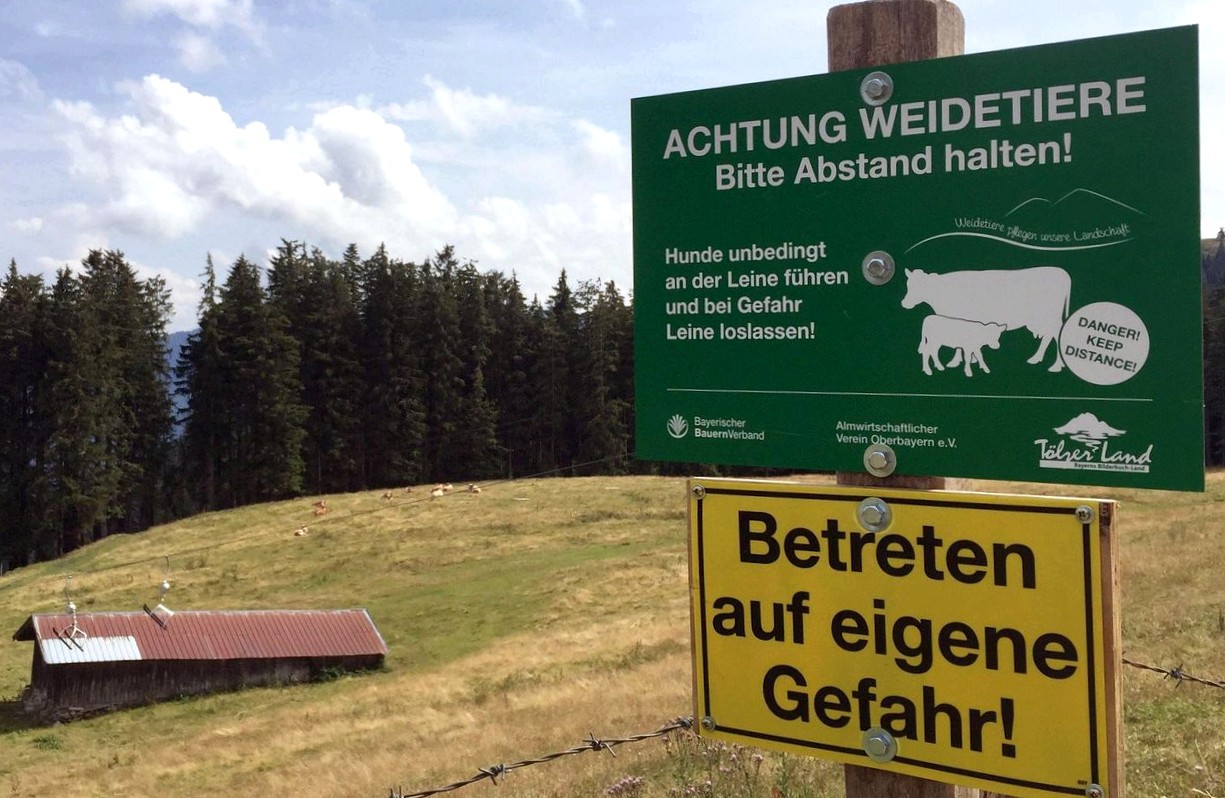
“Danger!”, a sign on the pasture fence near the blomberg near bad tolz warns. “Keep distance!” all over the bavarian alps you can find these signs, which are supposed to reach the foreign hiker in english as well. In franconia, it is more common for cows to escape from their pastures.
Alpine associations, tourism officials and farmers” associations react to an obviously underestimated danger: in austria, the encounter of a dog owner with cows ended fatally. The 45-year-old from rhineland-palatinate was trampled to death in 2014 in the stubaital by a herd that probably wanted to protect its calves from the dog. Now there is alarm on the flowery alpine meadows.
Innsbruck regional court: high compensation for damages
Above all, the ruling of the innsbruck regional court in february on the fatality is causing uncertainty – more among farmers than among tourists: the court awarded the surviving dependents around 180,000 euros in damages and a four-figure monthly pension. "Fear of liability has increased", says hans stockl, managing director of the almwirtschaftlichen verein oberbayern (alpine farming association of upper bavaria). In germany, too, a hiker was considering a lawsuit after she was run over by a young cow last summer at the gindelalm in the spitzing area.
In the meantime, further traps are being reported from austria: a good three weeks ago, a cow on the hochkonig in the district of pinzgau suddenly attacked a viennese woman passing by – presumably the animal had been startled. A good week later, a young cow knocked over a german hiker near solden, having run toward her with other young animals. Both women were taken to hospital by helicopter.
Bavarian alps: 50.000 animals in summer
In austria, some 270,000 of the animals are on alpine pastures in the summer; in the bavarian alps, the figure is 50,000. In many cases hiking trails cross the pastures. The alpine pasture association of upper bavaria advised farmers, among other things, to take out business liability insurance – and to issue warnings. This is how the "danger" hangs on the cow pastures-signs that also refer to the important services of the ruminants: "grazing animals take care of our landscape." Whether warning signs are sufficient in the event of an accident is an open question. In the opinion of the innsbruck court, fencing was necessary, especially at the site of the accident.
Often, they say, hikers had no clue how to behave. Many people no longer had any connection to agriculture and often not to the mountain world either. The danger increases when mother cows are on the pastures with calves who want to protect them. "The number of mothers on the alpine pastures increases. This also increases the tension between hikers and animals", says markus drexler of the bavarian farmers’ association.
The increasing rush to the mountains also aggravates the situation. Day tourism in particular has increased, says stockl. "It makes the mass. This also increases the proportion of those who travel recklessly." In addition, mountain bikers and more and more e-bikers are penetrating remote corners of the mountain world. Cyclists worry the cows more than hikers. Stockl says "that mountain biking in alpine pasture areas had to be restricted more severely" – not least because of the risk of accidents. Here, too, the alpine farmers fear liability, for example "if a mountain biker crashes or drives into a fence or an alpine vehicle."
Austria: "action plan for safe alpine pastures
A few weeks after the verdict on the fatal cow accident, austria issued an "action plan for safe alpine pastures. Those who do not adhere to the code of conduct will face legal consequences in the event of damage, said the then chancellor sebastian kurz (ovp).
"It is about the good cooperation between agriculture and tourism on austria’s alpine pastures." A possible dog ban on alpine pastures was quickly off the table. "We do not want to be a country of prohibitions, said tyrolean governor gunther platter (ovp) already in february after a "cow summit in innsbruck.
Bavaria: right of access
Simply locking out hikers and forbidding their passage is not possible, at least not in bavaria. "We have a free right of access in the free state of germany. The matter is therefore not to be solved with "forbidden", says markus drexler. Hikers had to take care – and the animal owners had to inform. The farmers’ association has issued a poster for alpine pastures and huts: "do not make any hectic movements. Animals are skittish", it reminds. And: "do not take selfies with grazing animals." An alpine pasture is not a petting zoo after all.
The mab rules are similar to those of austrians: leash dogs, but let them run in case of a cow attack; distance to herd and calves, and no noise that could make the animals nervous. According to the alpine association, talks are currently being held with other associations, including the nature conservationists and the german alpine association (DAV), with a view to possibly drawing up joint rules of conduct.
Rules of conduct are common sense
"You can reduce the number of conflicts", says DAV president josef klenner about the austrian plan. "Here are a few useful tips summarized." The rules of conduct, however, were by no means new and could also be understood with common sense. "When I go to the alpine pasture, I don’t have to step right next to the cow or pet the calf or let the dog run free – I should actually know that." He warns against hysteria. "I can say little about the specific case, which unfortunately ended fatally. But: to generalize would not be right."